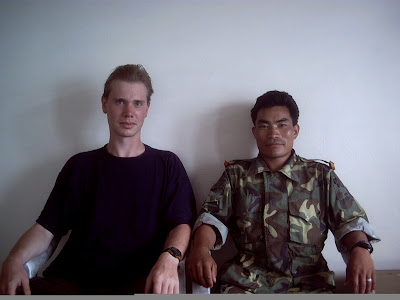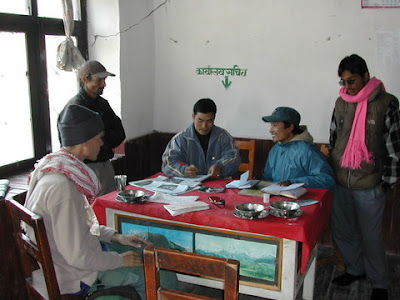Vijaya Chalise
The seven political parties have again created history by signing a new agreement which, after the amendment of the interim constitution, will make Nepal institutionally a federal democratic republic. Following the agreement, the parliament as well has expedited the interim constitution amendment process. Ultimately, after days of delayed negotiations, the seven political parties have made commitment for a federal democratic republic in the interim constitution.
23-point agreement
The 23-point agreement has stated that the decision on the republic would be implemented by the first meeting of the Constituent Assembly (CA), but a two-third majority of the interim parliament will be required to implement the proposal of republic prior to the CA polls if the king creates any obstruction against the election. Therefore, the king now will not have any role in the state of affairs, and the Prime Minister will perform all works of the head of the state until the agreement on a republic gets implemented. Therefore, the agreement has set the stage for Nepal's transition to a full republic less than two years after the king was forced to cede his dictatorial powers following the Maoist's decade-long people's war along with the historic people's movement-2 jointly launched by the seven parties and the Maoists. Consequently, after the Nepali Congress agreed to declare the country a republic in the process of abolishing the monarchy - a key Maoist demand - the agreed document epitomises the seven-party alliance's commitment and desire to bring the peace process to a successful conclusion by holding the CA election.
The Communist Party of Nepal-Maoist (CPN-Maoist) has decided to rejoin the government. The CPN-Maoist that ended a decade-long people's war against the feudal regime had left the interim government last September demanding the declaration of Nepal a republic prior to the CA polls and implementing an all out proportional electoral system. The proclamation of a republic and the kind of electoral system to adopt had been the major points of dispute among the political parties. The Maoists had called for an immediate abolition of monarchy to ensure free and fair elections to shape the country's political future. The recent agreement has cleared the deck, and it has now assured the Constituent Assembly polls, which have been postponed twice. The parties have agreed too hold the CA elections by mid-April, 2008 and increase the number of CA members to 601, allocating approximately 42 and 58 per cent of the seats for the first-past-the-post and proportional election system respectively, with 335 to be elected under the fully proportional system, 240 through the first-past-the-post and 26 to be nominated by the cabinet. The nominees will be from among ethnic and indigenous groups who are not represented in the first-past-the post and the proportional system. Other provisions of the agreement include: the government will form commissions and committees within one month on the disappeared persons, truth and reconciliation, state restructuring, scientific land reform, and high-level monitoring of the implementation of the past agreements. The agreement for creating a high-level steering committee to ensure that the political stakeholders in the government have an equitable say and participation in running the affairs of the government within a week will obviously help eliminate the past impression over the way the government was run and conducted. Not only the Maoists but all the cabinet colleagues, except for the Congress ministers, had accused the head of the government of trying to seek monopoly over the decision-making process without taking them into confidence.
Prime Minister Girija Prasad Koirala says the 23-point agreement inked by the seven political parties has fortified the people's faith in the parties that was gradually waning. He claimed that the declaration of Nepal as a republic had already been made by the seven parties, which would be given final shape by including it in the interim constitution through parliamentary proceedings. However, some of the Madhesi factions, Rastrya Prajatanra Party (RPP) and Janatantrik Party (RJP) give the impression of being not happy. However, lawmakers of the seven political parties have welcomed the agreement and the amendment proposal of the government brought accordingly. Maoist chairman Prachanda said the new agreement that was forged among the seven parties had opened the way for the Maoists to participate in the government and that his party would take part in the election for a meaningful Constituent Assembly.Despite the positive development on the constitutional and political fronts, the people, however, may continue to voice their doubts until the election is held after declaring the fresh date. The seven parties should obviously protect the rights of the minorities, but one cannot forget that minority rights are not about allowing minority communities a free hand to spread hateful ideologies, but are about protecting the lives, livelihood and rights guaranteed by the constitution and laws of the nation.
While the country has now embraced a federal democratic republican structure, the agitating groups, including those in the Terai, have come for talks and support the new constitution-making process if they really are against peace and the disintegration of the country. Therefore, the government and the leaders of the seven-party alliance should seriously think of protecting the rights of such agitating groups so as not to give a chance to foreign actors to play their card at disintegrating the nation.Now, the government and the seven-party alliance should be serious about constituting the promised six commissions and committees within the agreed time frame. Since the Election Commission has demanded at least 90 days after the promulgation of all the election-related laws in the in the run-up of the poll, the government should not fail to implement all the agreements on time. If the government and the seven-party alliance work sincerely as per the letter and spirit of the agreements with broader understandings, a conducive environment for a constitution election could be created. The pre-requisites for holding the election are obviously the implementation of past pacts and understandings reached between the Maoists and the government and effective enforcement of law and order across the country.
Future course
As the country is passing through a very fluid political phase and national integrity and sovereignty is at risk with the delaying CA polls, decisions taken at the moment are important in determining and setting the course of the future of the nation. Therefore, the political parties should demonstrate perseverance and sincerity to ensure that the ongoing democratisation and peace-building process bears tangible fruits.
Source: The Rising Nepal, December 29, 2007


